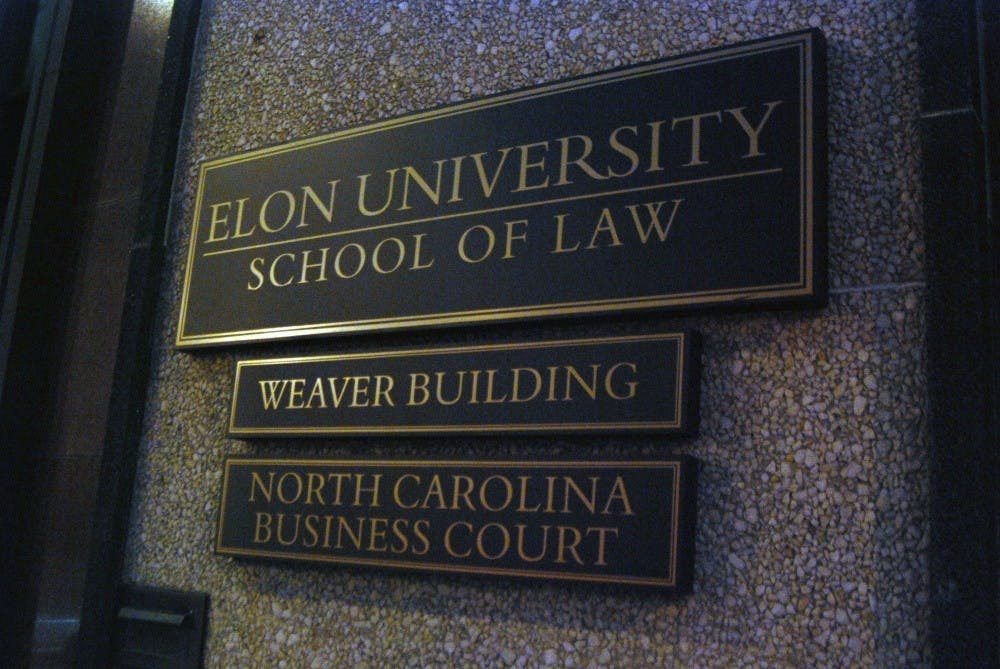In 2007, Bernie Brown was a professor of biochemistry at Wake Forest University, 15 years after he got his undergraduate degree in the same field, when he decided he wanted something different: a career in law.
Brown enrolled in the second class of Elon University's School of Law, a then–unaccredited but highly anticipated program among North Carolina law professionals.
"There was enthusiasm in the legal community," Brown said. "It was like, this is going to be a great school. Don't worry about accreditation."
Elon's School of Law opened in 2006 with 115 students under the direction of founding dean Leary Davis. A few things made it a remarkable program to those involved: the downtown location that allowed a close relation between law firms and the school, a practical approach to law education that included a strong element of leadership and Davis' experience starting a law school at Campbell University.
Five years down the line, the School of Law is in its first year fully accredited by the American Bar Association, and its second dean, George Johnson, is building on a foundation Davis and his staff created. Now, with 365 students and a vetted program shaped by four classes, the school is moving beyond the beginning stage.
"We've sort of plateaued out, like all law schools in the country," said law professor David Crowe. "But I think the law school is going to experience the same rise in credibility and reputation as the main university. I see great things down the road."
The school celebrated its fifth anniversary Oct. 6, bringing together President Leo Lambert, supporter Jim Melvin and advisory board chair David Gergen, former adviser to four United States presidents and current senior political analyst for CNN. The school also put out a report recently detailing its first five years and highlighting key factors like the strong leadership component that set its program apart.
When Crowe joined the founding committee, a body was charged in early 2004 with looking into the possibility of the law school, and he said the group looked at many different schools to get a feel for what kind of legal program Elon would want to put together.
"One of the thematic approaches when we were looking at law schools was legal education," Crowe said. "Basically, the principal thrust of legal education is to prepare you to take the BAR examination."
This was a common draw to law education at many of the schools he looked at during the founding process, Crowe said.
By the time Davis came on board, the idea became to fill a need in the kind of law education that was lacking — practical workplace leadership skills.
"The idea was not that the country needed another law school," Davis said. "It needed a different kind of law school."
In this way, Davis said the school is similar to its undergraduate counterpart, which places an emphasis on engaged learning.
"The two institutions as institutions of quality is a consistent message," he said. "We hope we can bring to the university what the university brings to us."
A lot of this learning style has transferred to the law school. The school emphasizes leadership and brings a practical approach to its education, with a downtown location that provides students opportunities to work with practicing lawyers.
But even when the program first started, Brown said it was a promising school. Although it was unaccredited and new when he enrolled, it was the promise of a different kind of law program and the security of Davis' background that made it an attractive option, he said.
The education he received at the law school has given him realistic experience that he brought to the workplace.
"What it has helped me do is navigate firm dynamics," Brown said. "(Like) knowing where you are in the organization and understanding that everyone starts out at the bottom."
Brown also said he's been lucky to be as successful as he has been right out of law school. His background sets him apart — an established career as a biochemist, including a postdoctoral fellowship at Massachusetts Institute of Technology, he said. For other people, it's been tough to break into the legal world, a problem for law students around the country.
"What's happened in law, it's very rare," Crowe said. "It's been in this period of economic downturn — you have law firms closing. It's a rough go in law right now."
Crowe said the school is in a good position, though, with its full accreditation, and he has high hopes for the program.
"I think long-range, this law school is going to be outstanding just as the university is outstanding," he said.


